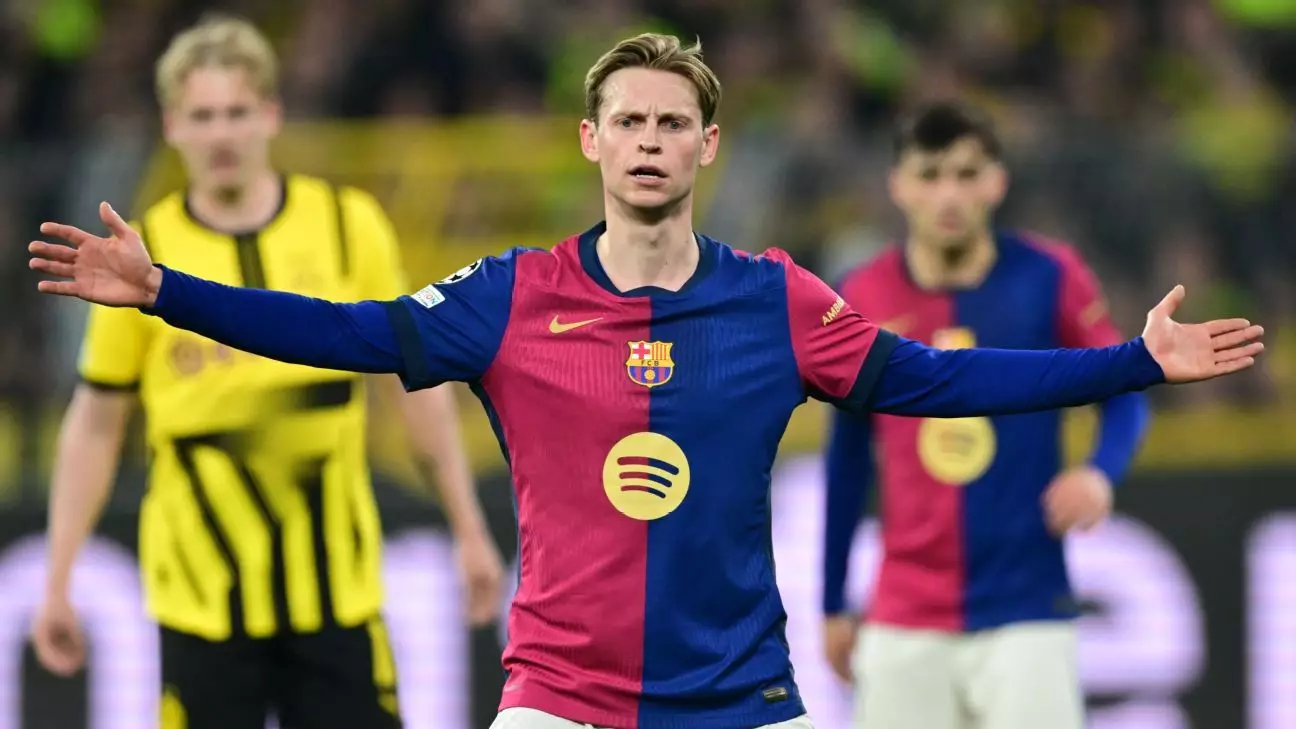Barcelona’s recent clash against Borussia Dortmund was emblematic of the duality that often defines high-stakes football—euphoria entwined with anxiety. The Catalan club celebrated reaching the UEFA Champions League semifinals for the first time since 2019, a fact that should have ignited unrestrained joy among players and fans alike. Yet, the atmosphere was dampened by the poignant reality of a 3-1 loss, which, despite Barcelona progressing with a 5-3 aggregate score, revealed cracks in a foundation that many had hoped was solidifying. It was a curious mix of accomplishment and discomfort, where celebrations seemed almost obligatory rather than heartfelt.
The compelling narrative of this fixture centered on their opponent’s rising star, Serhou Guirassy, whose hat trick dazzled onlookers. Yet for Barcelona, whose aggregate victory seemed assured after a commanding 4-0 win the week prior, there was a profound sense of vulnerability that echoed past humiliations in European competitions. The specter of their notorious collapses against teams like AS Roma and Liverpool haunted players and fans alike, reminding everyone that past wounds can shape present performances.
The Emotional Landscape of Victory
The players’ subdued response post-match illuminated a notable psychological conundrum. Raphinha’s reluctance to engage with the traveling Barca fans spoke volumes about the emotional weight of the game. Coach Hansi Flick’s observations about the mood in the dressing room reveal much about the mentality in elite sports: there is a relentless pressure to achieve perfection. For Barcelona, merely progressing to the semifinals is the baseline expectation, not a celebration of success.
Flick’s attempt to refocus the team on their accomplishments this season—a commanding lead in La Liga, a Copa del Rey final on the horizon, and a Spanish Supercopa triumph—tested their resilience against mounting expectations. The line between celebrating success and critiquing performance has blurred in the modern game. The implications of this are significant: can a team truly thrive under the weight of such lofty aspirations without succumbing to the pressure?
Formidable Foes and Future Challenges
Barcelona’s impending matches against powerful rivals, particularly a Copa del Rey encounter with Real Madrid and a crucial Champions League clash against either Bayern Munich or Inter Milan, present not just tactical challenges but the emotional trials of uncertainty. A solid showing earlier in the season has raised expectations astronomical levels, and each upcoming match is a test of both skill and composure under pressure.
The team roster boasts an impressive attacking trio: Raphinha, Robert Lewandowski, and the youthful Lamine Yamal, all of whom have contributed significantly to their goal tally this season. However, their reliance on key players has clearly exposed vulnerabilities when injuries and fatigue set in. The absence of Alejandro Balde, and resting of crucial players like Iñigo Martínez and Pedri, added layers of difficulty that they struggled to navigate against a resurgent Dortmund squad.
Dortmund’s fervent crowd, known as “The Yellow Wall,” created an electrifying yet intimidating atmosphere that highlighted Barcelona’s fragility in absorbing pressure. This was further evidenced when they conceded goals amid defensive lapses and collective misjudgments. From Wojciech Szczęsny’s slow reaction on the penalty that Guirassy converted to Jules Koundé’s tactical miscalculations, Barcelona’s previously lauded defense showed cracks that could be exploited by their future adversaries.
The Path Forward: Embracing Growth and Learning
Despite the immediate frustrations, Flick’s insistence on viewing their overall journey positively invites a deeper reflection on what success truly means at a club like Barcelona. It is easy to focus solely on victories; yet, what about the lessons learned from defeats? The Champions League semifinal spot holds significance, not just as a mark of recovery but also as a call to introspect and grow from shortcomings. Koundé’s candid remarks about the team’s lack of intensity compared to their first-leg performance serve as a crucial reminder that sustained excellence demands vigilance and constant evolution.
The remarks from both the coach and the players point to an emerging philosophy that embraces resilience as much as it celebrates victories. Moving forward, this approach may well define the trajectory of the club, as they seek to regain their place among Europe’s elite. Rather than viewing setbacks strictly as failures, Barcelona must take this experience as a catalyst for broader growth, embracing the potential for development that exists even in the wake of an inconsistency-laden performance. In professional sports, navigating emotional highs and lows is as critical as mastering tactical strategies—balancing ambition with grounding will be Barcelona’s ultimate challenge as they push forward in this fascinating season.

